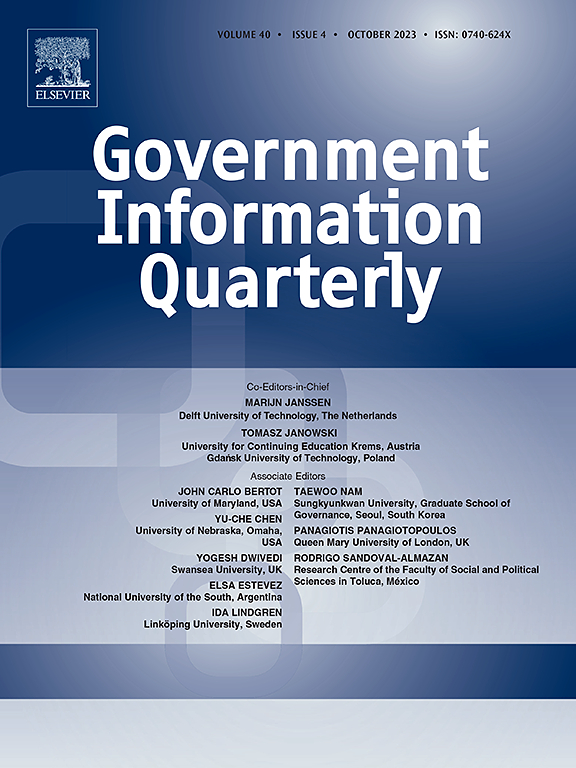电子政务中基于人工智能的聊天机器人的公众价值立场和设计偏好。证据来自市民和市政前台官员的联合实验
IF 10
1区 管理学
Q1 INFORMATION SCIENCE & LIBRARY SCIENCE
引用次数: 0
摘要
开发一个在市政办公室处理市民请求的聊天机器人需要多种设计选择。我们使用公共价值理论来测试价值定位如何影响这些设计选择。在一项联合实验中,我们要求德国公民(n = 1690)和市政部门的前台官员(n = 267)评估基于不同价值立场的聊天机器人设计,这些设计在实现目标方面存在差异:(1)维护安全、隐私和问责制,(2)提高行政绩效,(3)提高用户友好性和同理心。实验结果表明,公民更喜欢由国内公司编程的聊天机器人,重视聊天机器人进行日常决策,而不是自由裁量权,并且在对话失败时强烈倾向于人工干预。虽然通过启动改变公共部门价值观的显著性不会始终影响公民的设计选择,但我们发现公民和前台人员之间存在系统性差异。然而,这些差异是质的而不是根本的。我们得出的结论是,公民和前台人员拥有共同的公共价值观,这为聊天机器人的设计提供了充分的基础,从而克服了人工智能在公民与国家服务接触中潜在的合法性差距。本文章由计算机程序翻译,如有差异,请以英文原文为准。
Public value positions and design preferences toward AI-based chatbots in e-government. Evidence from a conjoint experiment with citizens and municipal front desk officers
Developing a chatbot to handle citizen requests in a municipal office requires multiple design choices. We use public value theory to test how value positions shape these design choices. In a conjoint experiment, we asked German citizens (n = 1690) and front desk officers in municipalities (n = 267) to evaluate hypothetical chatbot designs that differ in their fulfillment of goals derived from different value positions: (1) maintaining security, privacy, and accountability, (2) improving administrative performance, and (3) improving user-friendliness and empathy. Experimental results show that citizens prefer chatbots programmed by domestic firms, value chatbots taking routine decisions excluding discretion, and strongly prefer human intervention when conversations fail. While altering the salience of public sector values through priming does not affect citizens' design choices consistently, we find systematic differences between citizens and front desk officers. However, these differences are qualitative rather than fundamental. We conclude that citizens and front desk officers share public values that provide a sufficient basis for chatbot designs that overcome a potential legitimacy gap of AI in citizens-state service encounters.
求助全文
通过发布文献求助,成功后即可免费获取论文全文。
去求助
来源期刊

Government Information Quarterly
INFORMATION SCIENCE & LIBRARY SCIENCE-
CiteScore
15.70
自引率
16.70%
发文量
106
期刊介绍:
Government Information Quarterly (GIQ) delves into the convergence of policy, information technology, government, and the public. It explores the impact of policies on government information flows, the role of technology in innovative government services, and the dynamic between citizens and governing bodies in the digital age. GIQ serves as a premier journal, disseminating high-quality research and insights that bridge the realms of policy, information technology, government, and public engagement.
 求助内容:
求助内容: 应助结果提醒方式:
应助结果提醒方式:


